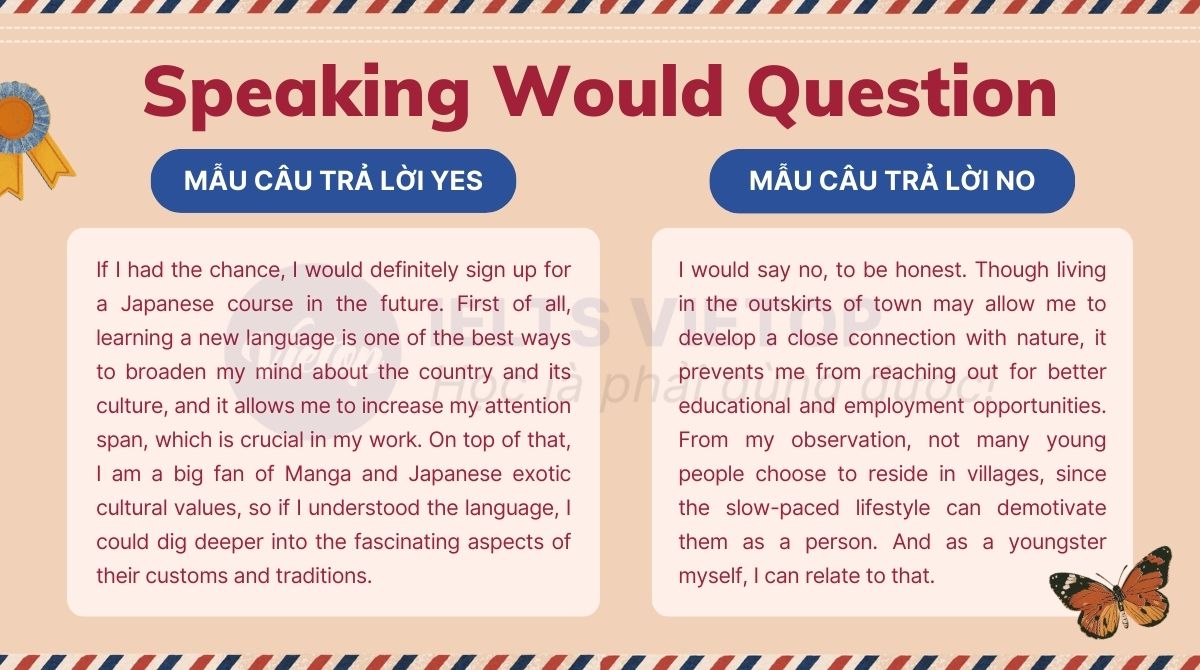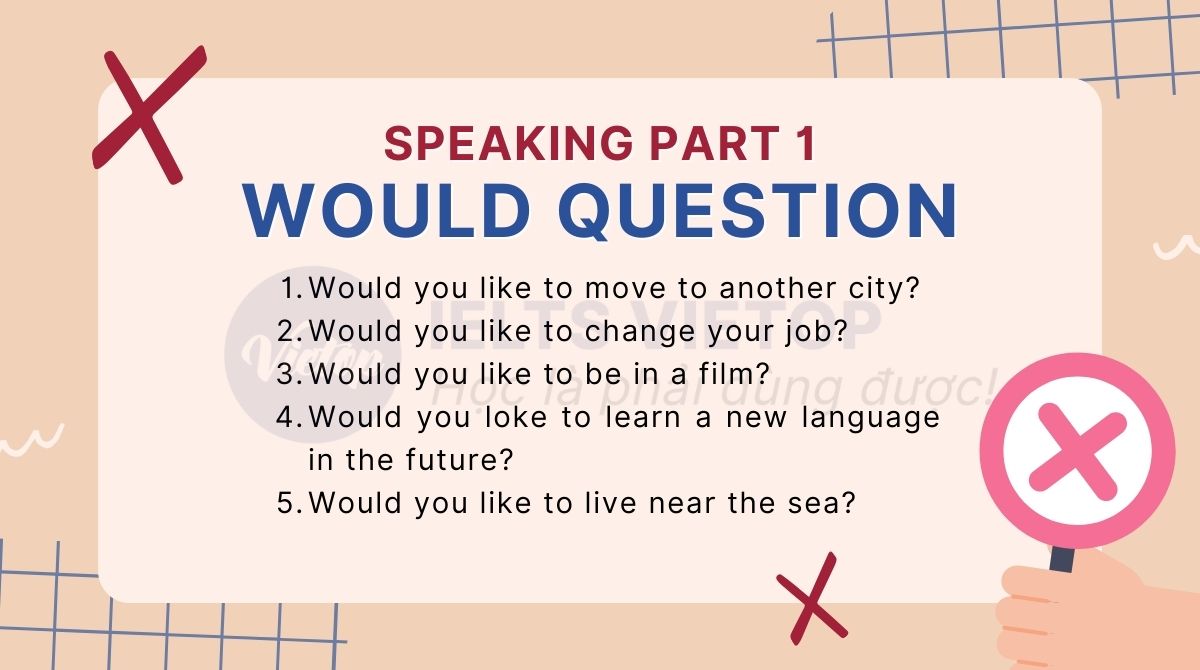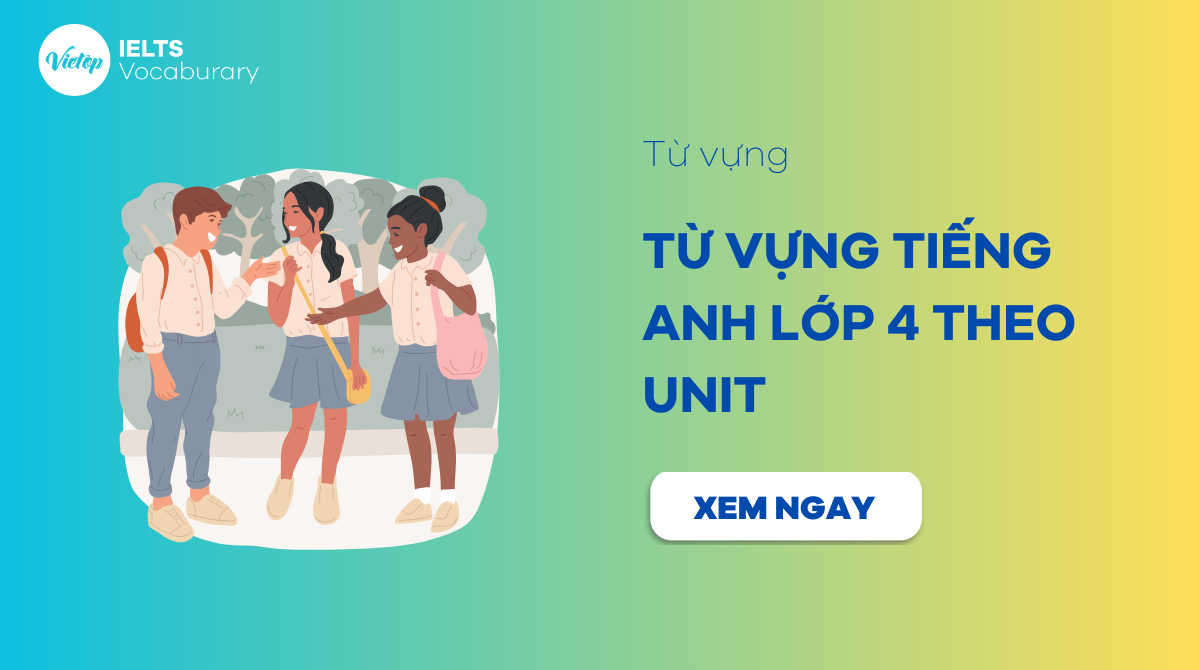Would question là một dạng câu hỏi thường xuất hiện trong IELTS Speaking part 1. Theo mình, cái khó của dạng câu hỏi này là người học thường gặp khó khăn trong việc tưởng tượng về các tình huống giả định, không nắm rõ cấu trúc ngữ pháp ghi điểm nên không thể diễn đạt ý tưởng của mình một cách rõ ràng và chính xác.
Để giải quyết vấn đề trên, mình sẽ cùng bạn tìm hiểu cách trả lời dạng câu hỏi would question. Cụ thể, bạn sẽ được học cách diễn đạt ý kiến, ý tưởng một cách rõ ràng và mạch lạc cũng như cách sử dụng các cấu trúc ngữ pháp phù hợp để biểu đạt quan điểm cá nhân một cách tự tin và chính xác khi đối diện với các câu hỏi dạng này.
Cùng mình bỏ túi cách trả lời dạng câu hỏi would question ngay!
| Nội dung quan trọng |
| Cấu trúc câu trả lời cơ bản: – Bước 1: Trả lời trực tiếp câu hỏi bằng would. – Bước 2: Đưa ra dẫn chứng, ví dụ để bổ sung cho câu trả lời. Có 3 cách để trả lời dạng câu hỏi would question: – Trả lời would theo câu điều kiện loại 2. – Trả lời would theo cấu trúc would like/ would prefer/ would rather. – Trả lời would theo cấu trúc câu phủ định. |
1. Cách trả lời dạng câu hỏi Would question
Theo ngữ pháp, nếu nếu câu hỏi là would thì bạn cần đưa câu trả lời là would/ could/ might. Thực tế khi thi IELTS Speaking, giám khảo thường mong đợi bạn sẽ sử dụng câu điều kiện loại 2 (second conditional) để trả lời dạng câu hỏi này.
Cấu trúc câu trả lời cơ bản:
- Bước 1: Trả lời trực tiếp câu hỏi bằng would.
- Bước 2: Đưa ra dẫn chứng, ví dụ để bổ sung cho câu trả lời.

1.1. Trả lời would theo câu điều kiện loại 2
Sử dụng câu điều kiện loại 2 cho phép bạn dùng would với những tình huống không có thật, không thể xảy ra ở hiện tại và tương lai.
Cấu trúc would trong câu điều kiện loại 2:
If + were/ V2/ Ved, S + would/ could/ might + V_inf.
E.g.:
- If I had more time, I would volunteer at the local animal shelter. (Nếu tôi có nhiều thời gian hơn, tôi sẽ tình nguyện tại nơi trú ẩn động vật địa phương.)
- If I could go back in time, I would change some of the mistakes I’ve made. (Nếu tôi có thể quay ngược thời gian, tôi sẽ thay đổi một số sai lầm mà tôi đã mắc phải.)
1.2. Trả lời would theo cấu trúc would like/ would prefer/ would rather
Sử dụng cấu trúc would like/ would love/ would prefer/ would rather bày tỏ mong muốn, sở thích.
Cấu trúc would like/ would love:
S + would like + N/ to V_inf.
S + would love + N/ to V_inf.
E.g.:
- I would love to travel around the world. (Tôi muốn đi du lịch vòng quanh thế giới.)
- I would like to become a doctor when I grow up. (Tôi muốn trở thành bác sĩ khi tôi lớn lên.)
Cấu trúc would prefer:
S + would prefer + N/ to V_inf.
S + would prefer + to V_inf + rather than + V_inf.
S + would prefer + V_ing + to + V_ing.
E.g.:
- Jane’s uncle would prefer a cup of coffee to a glass of milk. (Cậu của Jane thích cà phê hơn sữa.)
- I would prefer talking to everyone in person rather than communicating via email. (Tôi thích nói chuyện trực tiếp với mọi người hơn là trao đổi qua email.)
- I would prefer studying in a quiet library to working in a noisy cafe. (Tôi thích học tập trong thư viện yên tĩnh hơn là làm việc trong quán cà phê ồn ào.)
Cấu trúc Would rather:
S + would rather + V_inf.
S + would rather + N/ V_inf + than/ or + N/ V_inf.
E.g.:
- I would rather travel the world than settle down in one place. (Tôi muốn đi du lịch vòng quanh thế giới hơn là định cư ở một nơi.)
- I would rather go for a run than go to the gym. (Tôi thích đi chạy hơn là đến phòng gym.)
Cấu trúc would kết hợp với tính từ:
It would be + adj + to V_inf.
E.g.:
- It would be nice to have a break from work. (Sẽ rất tuyệt nếu có một kỳ nghỉ làm việc.)
- It would be wise to consult with a lawyer before signing any contracts. (Sẽ rất khôn ngoan nếu tham khảo ý kiến luật sư trước khi ký bất kỳ hợp đồng nào.)
1.3. Trả lời would theo cấu trúc câu phủ định
Thay vì trả lời kiểu như “I never thought about it”, bạn có thể sử dụng những cấu trúc câu phủ định sau để câu trả lời đa dạng hơn.
Các cấu trúc câu để bắt đầu câu trả lời:
- Well, quite honestly I don‘t think ever thought about that, but I guess … (Chà, thật lòng mà nói, tôi không nghĩ mình đã từng nghĩ về điều đó, nhưng tôi đoán …)
- Actually, this isn’t something that I’ve ever considered, but in short … (Thực ra, đây không phải là điều tôi từng cân nhắc, nhưng tóm lại …)
- I’m not really sure how to put this, but I suppose generally speaking … (Tôi không thực sự chắc chắn về cách diễn đạt điều này, nhưng tôi cho rằng nói chung …)
Các cấu trúc câu để diễn giải tiếp cho ý đầu tiên:
- I imagine I would possibly think about + V_ing … (Tôi tưởng tượng tôi có thể nghĩ về …)
- I guess I would maybe contemplate + V_ing … (Tôi đoán có lẽ tôi sẽ suy ngẫm về …)
- I would perhaps reflect on + V_ing … (Có lẽ tôi sẽ suy ngẫm về …)
- I suppose I would possibly consider + V_ing … (tôi cho rằng tôi có thể cân nhắc …)
Các cấu trúc câu để giải thích, đưa ra dẫn chứng:
- This is perhaps because … (Điều này có lẽ là do …)
- This could/ might be because … (Điều này có thể là vì …)
- It is mainly because … (Chủ yếu là vì …)
- This is due to the fact that … (Điều này là do thực tế là …)
E.g.: Actually, this isn’t something that I’ve ever considered, but in short, I guess I would maybe contemplate learning a new language. This could be because I find it fascinating to be able to communicate with people from different cultures and backgrounds. It would also be a great way to challenge myself mentally and keep my brain sharp.
(Trên thực tế, đây không phải là điều mà tôi từng cân nhắc, nhưng tóm lại, tôi đoán có lẽ tôi sẽ cân nhắc việc học một ngôn ngữ mới. Điều này có thể là do tôi thấy thật thú vị khi có thể giao tiếp với mọi người từ các nền văn hóa và nguồn gốc khác nhau. Đó cũng là một cách tuyệt vời để thử thách tinh thần bản thân và giữ cho bộ não của tôi luôn nhạy bén.)
Xem thêm:
- Cách trả lời dạng “Wh-/How” Questions – IELTS Speaking Part 1,3
- Cách trả lời dạng Types of Questions in IELTS Speaking Part 1
- Cách học bảng chữ cái tiếng Anh
2. Mẫu câu trả lời dạng would question
Dưới đây là hai cách trả lời dạng câu hỏi would question mẫu mà bạn có thể tham khảo:

2.1. Mẫu câu trả lời Yes
Examiner: Would you want to learn a new language in the future? (Bạn có muốn học một ngôn ngữ mới trong tương lai không?)
Trả lời câu hỏi Yes.
E.g.: If I had the chance, I would definitely sign up for a Japanese/ Korean course in the future. (Nếu có cơ hội, chắc chắn tôi sẽ đăng ký khóa học tiếng Nhật/Hàn trong tương lai.)
Nêu lợi ích của đối tượng đang nói đến với bản thân mình.
E.g.: Learning a new language, in my opinion, is one of the best ways to broaden my mind about the country and its culture, and it allows me to increase my attention span, which is crucial in my work. (Theo tôi, học một ngôn ngữ mới là một trong những cách tốt nhất để mở rộng suy nghĩ của tôi về đất nước và văn hóa của nó, đồng thời nó cho phép tôi tăng khả năng tập trung, điều này rất quan trọng trong công việc của tôi.)
Liên hệ đến tính cách bản thân và tính phù hợp của tính cách đó đối với đối tượng.
E.g.: I am an extrovert, so being able to communicate to people in their language would be a blessing to me. (Tôi là người hướng ngoại, nên có thể giao tiếp với mọi người bằng ngôn ngữ của họ sẽ là một điều may mắn đối với tôi.)
Liên hệ đến mọi người xung quanh.
E.g.: Everyone I know is now working on their third, or even fourth language and I don’t want to fall behind. (Mọi người tôi biết hiện đang nghiên cứu ngôn ngữ thứ ba hoặc thậm chí thứ tư và tôi không muốn bị tụt lại phía sau.)
Nêu điểm nổi bật mình đặc biệt yêu thích ở đối tượng.
E.g.: I am a big fan of Manga/ K-pop and Japanese/ Korean exotic cultural values, so if I understood the language, I could dig deeper into the fascinating aspects of their customs and traditions. (Tôi là một fan hâm mộ lớn của Manga/ K-pop và các giá trị văn hóa kỳ lạ của Nhật Bản/ Hàn Quốc, vì vậy nếu tôi hiểu được ngôn ngữ này, tôi có thể tìm hiểu sâu hơn về những khía cạnh hấp dẫn trong phong tục và truyền thống của họ.)
Kết hợp các ý lại, ta có câu trả lời mẫu như sau:
If I had the chance, I would definitely sign up for a Japanese/ Korean course in the future. First of all, learning a new language, in my opinion, is one of the best ways to broaden my mind about the country and its culture, and it allows me to increase my attention span, which is crucial in my work. On top of that, I am a big fan of Manga/ K-pop and Japanese/ Korean exotic cultural values, so if I understood the language, I could dig deeper into the fascinating aspects of their customs and traditions.
(Nếu có cơ hội chắc chắn tôi sẽ đăng ký khóa học tiếng Nhật/ tiếng Hàn trong tương lai. Trước hết, theo tôi, học một ngôn ngữ mới là một trong những cách tốt nhất để mở rộng suy nghĩ của tôi về đất nước và văn hóa của nó, đồng thời nó cho phép tôi tăng khả năng tập trung, điều này rất quan trọng trong công việc của tôi. Trên hết, tôi là một fan hâm mộ lớn của các giá trị văn hóa kỳ lạ của Manga/ K-pop và Nhật Bản/ Hàn Quốc, vì vậy nếu tôi hiểu được ngôn ngữ này, tôi có thể tìm hiểu sâu hơn về những khía cạnh hấp dẫn trong phong tục và truyền thống của họ.)
Xem thêm: Khóa học IELTS Online – Học trực tuyến cùng chuyên gia IELTS 8.5
2.2. Mẫu câu trả lời No
Examiner: Would you like to live in the countryside? (Bạn có muốn sống ở nông thôn không?)
Trả lời câu hỏi No
E.g.: I would say no, to be honest. (Tôi sẽ nói không, thành thật mà nói.)
Nêu lên tác động không tốt của đối tượng đang nói đến với bản thân mình
E.g.: Though living on the outskirts of town may allow me to develop a close connection with nature, it prevents me from reaching out for better educational and employment opportunities. (Mặc dù sống ở vùng ngoại ô thị trấn có thể cho phép tôi phát triển mối liên hệ chặt chẽ với thiên nhiên, nhưng điều đó ngăn cản tôi tiếp cận các cơ hội giáo dục và việc làm tốt hơn.)
Liên hệ đến tính cách bản thân và sự trái ngược của tính cách đó đối với đối tượng
E.g.: I am not a person who can stand the absolute tranquility in the countryside, because I’m drawn to the liveliness of city life at night. (Tôi không phải là người có thể chịu được sự yên tĩnh tuyệt đối ở nông thôn, bởi tôi bị cuốn hút bởi sự sôi động của cuộc sống thành phố về đêm.)
Liên hệ đến mọi người xung quanh
E.g.: From my observation, not many young people choose to reside in villages, since the slow-paced lifestyle can demotivate them as a person. As a youngster myself, I can relate to that. (Theo quan sát của tôi, không có nhiều người trẻ chọn sống ở làng quê, vì lối sống chậm rãi có thể khiến họ mất đi động lực làm người. Bản thân tôi là một người trẻ, tôi có thể liên tưởng đến điều đó.)
Nêu điểm mình không thích ở đối tượng
E.g.: There is not much infrastructure investment outside big cities, which means recreational areas are out of reach when living in the countryside. I couldn’t imagine how I would live without shopping malls, cinemas, and eateries. (Không có nhiều đầu tư cơ sở hạ tầng bên ngoài các thành phố lớn, điều đó có nghĩa là các khu giải trí nằm ngoài tầm với của người sống ở nông thôn. Tôi không thể tưởng tượng mình sẽ sống thế nào nếu không có trung tâm mua sắm, rạp chiếu phim và quán ăn.)
Kết hợp các ý lại, ta có câu trả lời mẫu như sau:
I would say no, to be honest. Though living on the outskirts of town may allow me to develop a close connection with nature, it prevents me from reaching out for better educational and employment opportunities. From my observation, not many young people choose to reside in villages, since the slow-paced lifestyle can demotivate them as a person. And as a youngster myself, I can relate to that.
(Tôi sẽ nói không, thành thật mà nói. Mặc dù sống ở vùng ngoại ô thị trấn có thể cho phép tôi phát triển mối liên hệ chặt chẽ với thiên nhiên, nhưng điều đó ngăn cản tôi tiếp cận các cơ hội giáo dục và việc làm tốt hơn. Theo quan sát của tôi, không có nhiều người trẻ chọn sống ở làng quê, vì lối sống chậm rãi có thể khiến họ mất đi động lực làm người. Và bản thân tôi là một người trẻ, tôi có thể đồng cảm với điều đó.)
3. Phần luyện tập trả lời dạng would question
Thực hành ngay phần thi Speaking part 1 dạng would question thông qua 1 số câu hỏi sau:

- Question 1: Would you like to move to another city?
- Question 2: Would you like to change your job?
- Question 3: Would you like to be in a film?
Sample Answers
Answer 1:
Well, quite honestly I don‘t think I ever thought about that, but I guess I would consider moving to Danang. The reason for this is that the weather in this city is very pleasant and the cost of living is also cheaper than that in Saigon. Although Danang is less developed than Saigon, it is going through rapid development. Therefore, if I lived in this city, I wouldn’t have any difficulty finding a well-paid job.
(Thành thật mà nói thì tôi chưa từng nghĩ đến điều đó, nhưng tôi đoán tôi sẽ cân nhắc việc chuyển đến Đà Nẵng. Nguyên nhân là do thời tiết ở thành phố này rất dễ chịu và chi phí sinh hoạt cũng rẻ hơn ở Sài Gòn. Đà Nẵng tuy kém phát triển hơn Sài Gòn nhưng lại có tốc độ phát triển nhanh chóng. Vì vậy, nếu tôi sống ở thành phố này, tôi sẽ không gặp khó khăn gì khi tìm được một công việc được trả lương cao.)
Answer 2:
Actually, if I had the opportunity, I would definitely consider changing careers from content creator to event planner. There are a couple of reasons for this. On the one hand, I enjoy the creativity involved in content development, but on the other hand, I’m drawn to the fast-paced, dynamic environment of event management. I think I would thrive on the challenge of organizing and overseeing successful events.
(Thực sự, nếu có cơ hội, tôi chắc chắn sẽ cân nhắc việc chuyển từ việc làm sáng tạo nội dung sang làm tổ chức sự kiện. Có một vài lý do cho việc này. Một mặt, tôi thích sự sáng tạo liên quan đến việc phát triển nội dung, nhưng mặt khác, tôi bị cuốn hút vào môi trường năng động, nhịp độ nhanh của việc quản lý sự kiện. Tôi nghĩ rằng tôi sẽ phát triển mạnh mẽ trước thử thách tổ chức và giám sát các sự kiện thành công.)
Answer 3:
If I were to be involved in the film industry, I would probably lean towards a role behind the scenes rather than in front of the camera. I think I’d find it more fulfilling to work behind the scenes as a special effects technician. Because the opportunity to work on creating stunning visual effects that captivate audiences and enhance storytelling would be incredibly rewarding.
(Nếu như tôi tham gia vào ngành điện ảnh, có lẽ tôi sẽ hướng đến một vai trò hậu trường hơn là trước ống kính máy quay. Tôi nghĩ mình sẽ thấy thỏa mãn hơn khi làm việc hậu trường với vai trò kỹ thuật viên hiệu ứng đặc biệt. Thế giới của hiệu ứng đặc biệt luôn khiến tôi say mê. Sự sáng tạo và chuyên môn kỹ thuật cần thiết để biến những yếu tố kỳ thú trong phim thành hiện thực dường như vô cùng đáng giá.)
Xem thêm:
- Làm thế nào để đạt IELTS Speaking band 6.0+?
- Tổng hợp 105 Từ vựng IELTS Speaking Part 1 thường gặp
- Brainstorming – Động não trong phần thi IELTS Speaking
- IELTS Writing task 2
4. Kết luận
Vừa rồi là những cách trả lời dạng câu hỏi would questions mà bạn có thể tham khảo để chuẩn bị cho phần thi IELTS Speaking part 1. Hãy luyện tập vận dụng những mẫu câu trên vào bài Nói của bạn để tự tin trả lời dạng câu hỏi này.
Ngoài ra, mình xin tổng kết lại một vài điều cần lưu ý như sau:
- Với dạng câu hỏi would, cấu trúc ngữ pháp được khuyên dùng là câu điều kiện loại 2 vì nó vừa giúp paraphrase câu hỏi của giám khảo mà lại còn là một cấu trúc câu phức dễ dùng.
- Cố gắng luyện triển khai bài Nói của bạn theo quy tắc kỹ quy tắc “Phản hồi dài – Cụm từ liên kết – Câu phức tạp – Ngôn ngữ dư thừa”.
- Dù muốn hay không muốn làm điều mà câu hỏi đề cập đến, hãy giải thích vì sao để câu trả lời của mình được cụ thể hơn.
Nếu bạn còn đang thắc mắc bất kỳ điều gì, đừng ngại để lại comment bên dưới, IELTS Vietop sẽ hỗ trợ tư vấn bạn. Chúc bạn luyện thi IELTS thành công!
Tài liệu tham khảo:
Would Questions [IELTS SPEAKING TEST – PART 1]: https://peterquoc.com/ielts-speaking-type-7-would/ – Truy cập ngày 22-03-2024.










